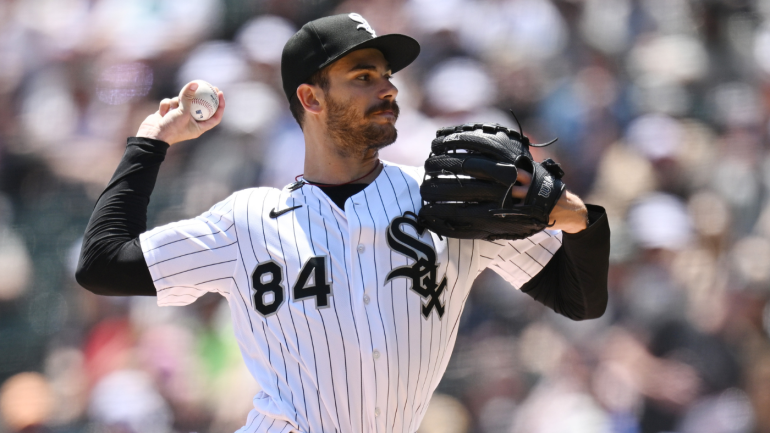
Last week, the Milwaukee Brewers traded ace Corbin Burnes to the Baltimore Orioles in exchange for two young players and a draft pick. It took longer than anticipated, but Burnes finally joined Tyler Glasnow as the second major starting pitcher trade candidate to get moved this winter. (Glasnow was dealt from the Tampa Bay Rays to the Los Angeles Dodgers all the way back in December.)
Burnes and Glasnow weren't the only star right-handers who populated trade candidate lists in November. They were often lumped alongside the likes of Shane Bieber and Dylan Cease. You can understand how Bieber's injury-ravaged season complicated his situation, but Cease? That's harder to figure. He's a year removed from finishing second in Cy Young Award voting; he's been an above-average starter, blessed with tantalizing stuff and upside, throughout his career; and he's slated to hit free agency after the 2025 campaign. At the onset of the winter, he seemed like a sure bet to be moved.
Yet here we are, drawing ever closer to pitchers and catchers reporting, and Cease remains a member of the White Sox. Will that change over the next week? What about over the next month? New White Sox boss Chris Getz offered a standard response to that question when he was asked in January. "It's ever evolving in terms of the urgency of other clubs," he said. "It could be in the offseason. It could be at the deadline. It could be in May. There's just so many different factors when you're talking about 29 other clubs."
Only the universe knows for sure if and when Getz will find a deal to his liking. For our part, we continue to expect the White Sox to make a move before Opening Day. Here are three reasons influencing our thinking.
1. The White Sox are wretched
We may as well start here. The White Sox won 61 games last season. They finished with a minus-200 run differential, making them one of three clubs to clear that mark -- the others being the Colorado Rockies and the not-trying Oakland Athletics. They've made a number of offseason additions since, but more of the bottom-of-the-roster variety than anything game-changing.
That's fine, though it leaves the White Sox in a non-competitive state. Both Baseball Prospectus and FanGraphs released their initial batch of projected standings this week. Neither forecast model sees the White Sox as a real threat in the lowly American League Central. Prospectus' PECOTA has Chicago winning 66 games, good for last in the division; FanGraphs' concoction, meanwhile, has the White Sox winning 68, also good for last.
Dylan Cease's 6th and 7th Ks.
— Rob Friedman (@PitchingNinja) June 27, 2023
Thru 4. pic.twitter.com/f7heeYYl0Q
Projection systems are fallible. Even the best tend to miss by more than a handful of games per team on average. Their outputs should not be taken as faits accomplis. But look at the White Sox roster and try to argue that's a team likely to finish on the sunny side of 75 wins, let alone the 85-plus it almost always takes to win the division -- even one as weak as the Central.
If the White Sox were 10 to 15 wins better on paper, you could argue they should hold onto Cease and take their chances into the summer. They aren't, and so it's a little easier to take the bird's eye view on their situation. To wit.
2. Trade is best, if not only, way forward
It's not just that these White Sox are unlikely to compete in 2024. It's that they're also unlikely to compete the following season, when Cease is even closer to free agency. The White Sox had a good deadline, in our opinion, netting catcher Edgar Quero, lefty Jake Eder, and righty Nick Nastrini in various deals. Factor in shortstop Colson Montgomery, lefty Noah Schultz, and third baseman Bryan Ramos, and there's more talent on the farm than there has been in a while.
Even if everything goes perfectly with the development of those players -- and it won't; Montgomery and Schultz alone missed serious action last year because of injuries -- they probably wouldn't arrive and thrive at the big-league level in time to sync up with Cease's White Sox tenure.
Dylan Cease's 2Ks in the 3rd. ⚔️
— Rob Friedman (@PitchingNinja) June 16, 2023
6Ks thru 3 pic.twitter.com/55guuEZsJc
You might wonder, if the White Sox believe so much in their young players and in Getz's ability to draft and develop more, then what about extending Cease?
The White Sox have a lot of money coming off the books next winter. They can bail on Yoán Moncada and Eloy Jiménez, a pair making nearly $40 million in 2024, by declining their club options. It's probably fair to think Cease will clear $25 million annually on his next contract. He'll pitch his first season of that deal at age-30, making it reasonable to see him getting four-plus years, too.
For reference, the largest contract in White Sox history belongs to Andrew Benintendi's five-year pact worth $75 million. Ignoring other team-building considerations -- even those that come with shunning Moncada and Jiménez -- the White Sox could keep Cease at market prices, but would they want to? Given owner Jerry Reindsdorf's history, we're inclined to think no.
If you accept that Cease is unlikely to be a White Sox member beyond the 2025 season regardless, then the next part also becomes self evident.
3. Cease's trade value may only decline
An inconvenient truth for the White Sox is that Cease will probably never possess more trade value than he does right now.
Modern front offices are hyper-aware of the surplus value concept. In turn, they're far more willing to part with top prospects for two seasons than they are for one, or even one and a half. That shift in thinking has taken root over the past decade, to sometimes ruinous effect, and explains why the return on Burnes, though decent in our eyes, felt a little light.
In theory, the White Sox could hold onto Cease with the hope that he has a dominant first half that recalls his near-Cy Young-worthy 2022. It's fair to wonder, if that were that to transpire, if his value would improve. That's a risky proposition, however, and one that could end up backfiring.
Dylan Cease's 5th and 6th Ks. pic.twitter.com/eXuuVCZfv1
— Rob Friedman (@PitchingNinja) July 16, 2023
Foremost, Cease may be a dynamic pitcher with some upside remaining, but that 2022 season stands out as the exception rather than the rule of his career. If he were to pitch to his typical result heading into the deadline, it seems unlikely that his performance would bolster his stock. (And indeed, you could argue it would still be net negative given the reduced time of control.)
Even if you're optimistic about Cease's chances of having another award-caliber season, you cannot take his health for granted. He's a pitcher, after all, and they tend to get hurt -- sometimes at inconvenient points.
The decision-making calculus is rarely so simple as to say "this player is at peak value to other teams, let's move him." There are human factors to take into account, as well as larger business and competitive ramifications. With that acknowledged and accepted, the White Sox seem to be in a state where everything points toward trading Cease ahead of the start of the season.
That doesn't guarantee the White Sox will move Cease over the coming weeks. It just means they probably should.




















